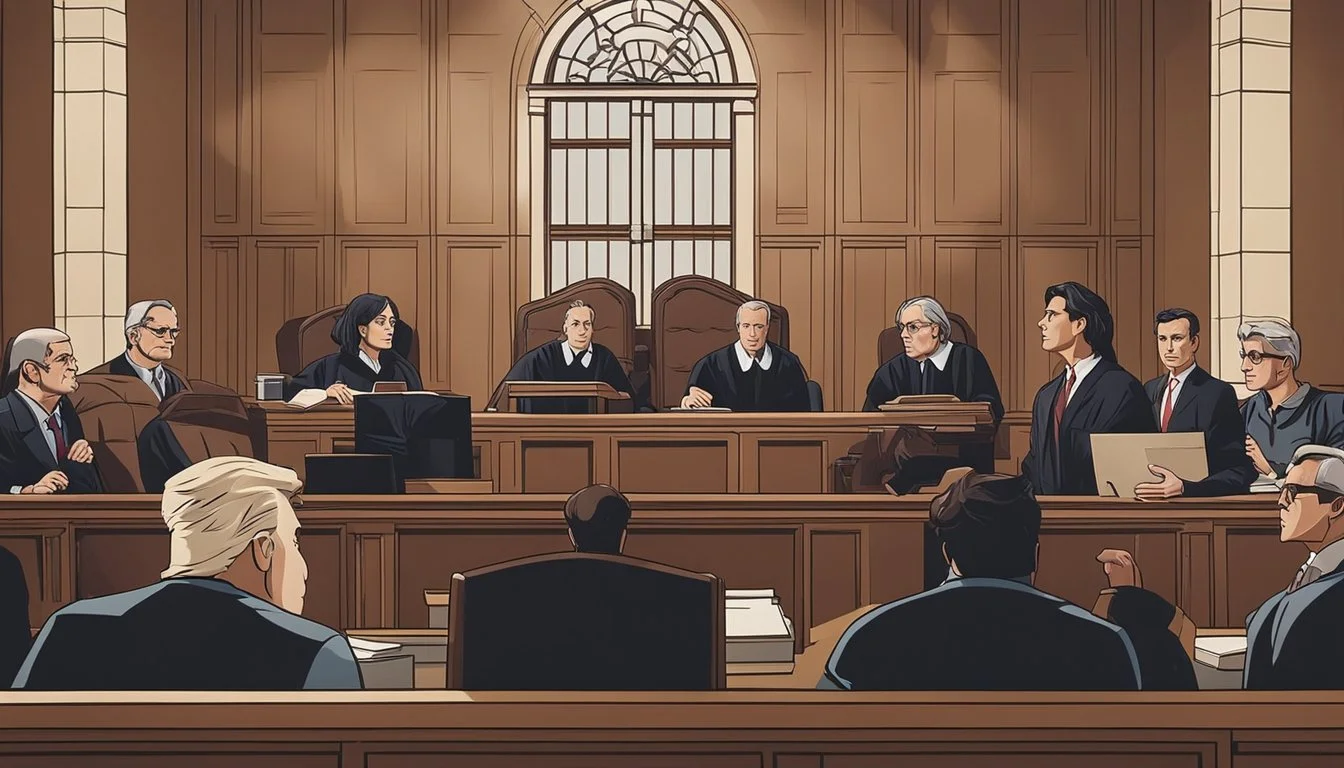Ethical Concerns Arise as Filmmaker Blurs Lines in True Crime Documentary Dear Zachary
"Dear Zachary: A Letter to a Son About His Father" is a powerful documentary that raises important ethical questions about filmmaking and personal involvement in true crime stories. Directed by Kurt Kuenne, the film chronicles the tragic events surrounding the murder of his close friend, Andrew Bagby, and the subsequent custody battle for Andrew's son, Zachary.
The documentary's unique perspective stems from Kuenne's intimate connection to the subjects, blurring the lines between objective storytelling and personal grief. This closeness to the story both enhances the film's emotional impact and challenges traditional notions of documentary ethics, prompting viewers to consider the role of objectivity in non-fiction filmmaking.
As the narrative unfolds, revealing shocking twists and heartbreaking outcomes, the audience is forced to grapple with the ethical implications of Kuenne's deeply personal approach. The film's raw emotion and unflinching portrayal of loss spark debates about the responsibilities of documentary filmmakers when dealing with sensitive subject matter and the potential consequences of becoming too emotionally invested in one's work.
Contextualizing 'Dear Zachary'
'Dear Zachary' is a documentary that emerged from tragedy, centering on the life and death of Dr. Andrew Bagby. The film's creation and impact are deeply intertwined with personal connections and a quest for justice.
Who Was Dr. Andrew Bagby?
Dr. Andrew Bagby was a promising young physician whose life was cut short in 2001. He was murdered at the age of 28 by his ex-girlfriend, Dr. Shirley Jane Turner.
Bagby was known for his compassionate nature and dedication to his medical career. He had recently completed his residency and was beginning a new chapter in his professional life when the tragic event occurred.
Kurt Kuenne, a close friend of Bagby's since childhood, decided to create a documentary as a tribute. The film serves as a video memoir for Bagby's unborn son, Zachary.
'Dear Zachary' chronicles Bagby's life through interviews with family and friends. It paints a portrait of a beloved individual whose potential was never fully realized due to the shocking circumstances of his death.
The Tragic Narrative
"Dear Zachary" unfolds a devastating story of loss, grief, and systemic failures. The documentary captures the profound impact of a senseless murder on a family and community.
A Tale of Murder and Loss
Dr. Andrew Bagby's life was cut short by his ex-girlfriend, Shirley Turner. The young physician's promising future vanished in an instant, leaving his loved ones reeling. Kurt Kuenne, Bagby's close friend, set out to create a tribute film for Bagby's unborn son, Zachary.
This project took an unexpected turn when Turner fled to Canada while pregnant with Bagby's child. The documentary shifted focus, chronicling the legal battle that ensued as Bagby's parents fought for custody of their grandson.
The Aftermath and Impact on Family
David and Kathleen Bagby, Andrew's parents, found themselves thrust into an unimaginable situation. They relocated to Canada, dedicating themselves to raising Zachary and seeking justice for their son's murder.
The film captures their tireless efforts to navigate the legal system and protect their grandson. It portrays their strength in the face of overwhelming grief and frustration with bureaucratic obstacles.
Tragically, the story takes another devastating turn when Turner kills both herself and baby Zachary. This heartbreaking event amplifies the film's message about systemic failures and the need for legal reform.
Filmmaking Dynamics
Kurt Kuenne's background and artistic choices shaped the unique approach taken in "Dear Zachary." His personal connection to the story influenced both the film's style and emotional impact.
Kurt Kuenne's Creative Journey
Kuenne began his filmmaking career with shorts and independent features. He directed "Drive-In Movie Memories" and created several Super 8 productions. These early works honed his skills in visual storytelling and editing.
Kuenne's friendship with Andrew Bagby motivated him to make "Dear Zachary." His personal involvement gave the film an intimate perspective. This closeness to the subject matter pushed Kuenne to innovate in his storytelling techniques.
The director's background in fiction filmmaking informed his documentary approach. He applied narrative techniques to real-life events, creating a hybrid style. This fusion of documentary and dramatic elements became a hallmark of the film.
Documentary Style and Technique
"Dear Zachary" employs a rapid-fire editing style. Kuenne used quick cuts and overlapping audio to convey urgency and emotion. This technique mimics the chaotic nature of the events portrayed.
The film incorporates a mix of media:
Home videos
Photographs
News footage
Interviews
Kuenne narrates the documentary himself, adding a personal touch. His voice guides viewers through the complex story, providing context and emotional resonance.
The film's structure unfolds like a mystery. Kuenne reveals information gradually, building tension and engagement. This approach keeps viewers invested in the story's outcome.
The Cultural and Emotional Resonance
"Dear Zachary" struck a powerful chord with audiences and critics alike, leaving a lasting impact on the true crime genre. The film's raw emotional honesty and innovative storytelling approach resonated deeply across cultural boundaries.
Public and Critical Reception
"Dear Zachary" received widespread acclaim upon its release. Critics praised Kuenne's intimate approach and the film's emotional intensity. The documentary premiered at the Slamdance Film Festival, quickly gaining momentum on the festival circuit.
MSNBC acquired broadcast rights, exposing the film to a wider audience. Viewers were deeply moved by the personal nature of the story and Kuenne's heartfelt tribute to his friend.
The film earned numerous accolades, including nominations at prestigious international film festivals. Its honest portrayal of grief and injustice sparked important conversations about the legal system and child protection.
Influence on True Crime Genre
"Dear Zachary" redefined expectations for true crime documentaries. Its innovative blend of home videos, interviews, and narration created an immersive, emotionally charged experience.
The film's success inspired other filmmakers to take more personal approaches to true crime stories. It demonstrated the power of combining factual reporting with intimate, emotional storytelling.
"Dear Zachary" raised the bar for audience engagement in documentaries. Its ability to evoke strong emotional responses while presenting complex legal and social issues became a benchmark for future true crime films.
The documentary's impact extended beyond entertainment, influencing discussions about legal reform and victim advocacy. It showed how personal stories can drive broader social change.
The Legal and Ethical Quagmire
The case of Andrew Bagby's murder and its aftermath exposed critical flaws in the Canadian legal system. It raised serious questions about bail practices and custody rights for accused murderers.
Failures of the Canadian Legal System
The Canadian justice system faced intense scrutiny for its handling of Shirley Jane Turner's case. Despite being charged with first-degree murder, Turner was granted bail. This decision allowed her to remain free while awaiting extradition to the United States.
The prosecution's inability to keep Turner in custody highlighted weaknesses in Canada's bail laws. Critics argued that individuals accused of violent crimes posed too great a risk to public safety when released.
Turner's ability to delay extradition proceedings further exposed loopholes in the system. She successfully prolonged the legal process for months, frustrating attempts to bring her to trial in the U.S.
Custody Battles and Bail Controversy
Turner's pregnancy and subsequent custody battle for Zachary added another layer of complexity to the case. The Canadian courts granted Turner partial custody of Zachary, despite her status as a murder suspect.
This decision sparked outrage and debate over the rights of accused criminals in custody disputes. Many questioned whether Turner's parental rights should have superseded concerns for Zachary's safety.
The custody arrangements required Andrew Bagby's parents to interact regularly with their son's alleged killer. This situation put immense emotional strain on the family and raised ethical questions about victim's rights.
Turner's eventual actions tragically validated concerns about her custody rights. The case prompted calls for reform in how the legal system balances parental rights with child protection in criminal cases.
Commemoration and Legacy
"Dear Zachary" sparked efforts to honor the victims and drive legal changes. The film's impact extended beyond its emotional storytelling, leading to concrete actions in memory of Andrew and Zachary Bagby.
Remembering Zachary and Andrew
Kurt Kuenne's documentary serves as a living tribute to Andrew Bagby and his son Zachary. The film incorporates home videos, photographs, and interviews to create a digital scrapbook of their lives. Friends and family share cherished memories, ensuring Andrew and Zachary's stories live on. This preservation of memories allows viewers to connect with the victims on a personal level, transforming them from statistics into real people with hopes, dreams, and loving relationships.
Legislative Reforms and Zachary's Bill
The tragic events depicted in "Dear Zachary" prompted calls for legal reform in Canada. Canadian MP Scott Andrews introduced Zachary's Bill, named in honor of Zachary Bagby. This proposed legislation aimed to amend bail laws, particularly for individuals accused of serious crimes. The bill sought to shift the burden of proof onto the accused in certain cases, requiring them to demonstrate why they should be granted bail. While the original bill did not pass, it sparked ongoing discussions about bail reform and victim protection in Canada's legal system.
Beyond the Documentary
Kurt Kuenne's work on "Dear Zachary" sparked further creative endeavors and left a lasting impact on the documentary genre. His subsequent projects built upon the emotional storytelling techniques he developed.
Subsequent Projects and Influential Work
Kuenne continued his filmmaking career after "Dear Zachary" with several notable projects. He directed "Shuffle" (2011), a mystery drama that explored themes of memory and identity. The film showcased Kuenne's ability to craft intricate narratives beyond the documentary format.
In 2015, Kuenne released "The Legacy of Dear Zachary: A Journey to Change Law". This follow-up documentary chronicled the efforts of David and Kate Bagby to change Canadian bail laws after the events depicted in the original film. It highlighted the real-world impact of Kuenne's work.
Kuenne's innovative approach to personal storytelling in "Dear Zachary" influenced other filmmakers. His use of rapid editing, archival footage, and emotional narration became techniques adopted by many in the true crime documentary genre.
The director also continued his work creating "memory albums" - video tributes for friends and family members. This practice, which began with "Dear Zachary", became a signature aspect of Kuenne's filmmaking style.








